 A promising anti-spam service by Israeli company Blue Security has been brought to its knees by a renegade spammer hell-bent on protecting his spamming industry
A promising anti-spam service by Israeli company Blue Security has been brought to its knees by a renegade spammer hell-bent on protecting his spamming industry
Created by Eran Reshef, Blue Security came up with what looked like a cunningly simple plan to mash up the mass mailers: fight spam with spam.
The company set up a ‘Do Not Intrude Registry’ (similar to the Do Not Call Registry for telemarketing) and invited members to download a small application called Blue Frog, which automatically sent out requests to spammers to stop sending junk e-mail.
Of course, spammers aren’t renowned for paying attention to opt-out requests, so Blue Frog came with a rather nasty bite to make sure they paid attention: the software bombarded spammers with requests from all 522,000 of its customers at the same time.
It seemed to work too – Blue Security claimed that “six out of the top ten spammers” had complied with their opt-out requests and after signing up to the free service, we found our spam dropping dramatically. But not for long.
 Spammers fight back
Spammers fight back
Not surprisingly, spammers don’t like it up ’em and soon started fighting back with a counter attack, launching a campaign of extortion e-mail messages threatening to flood users with nonsensical spam and viruses unless they removed their name from the Do Not Intrude registry.
This was followed by a sophisticated denial of service attack using tens of thousands of hijacked computers which managed to knock Blue Security’s Website off the Web.
According to Reshef, a shady Russian-speaking spammer known as PharmaMaster then managed to bribe a staff member at a top-tier ISP into ‘black holing’ Blue Security’s former IP address (194.90.8.20) at Internet backbone routers – effectively rendering Blue’s main Website invisible to anyone outside of Israel.
Rather sinisterly, PharmaMaster told Blue Security in an ICQ conversation, that if he can’t send spam, there will be “no Internet.”
 With Blue Security reduced to communicating through their secondary TypePad-hosted Weblog at bluesecurity.blogs.com, the spammer moved in for the kill, launching a ferocious denial of service attack that closed down the TypePad and Live Journal servers owned by Six Apart.
With Blue Security reduced to communicating through their secondary TypePad-hosted Weblog at bluesecurity.blogs.com, the spammer moved in for the kill, launching a ferocious denial of service attack that closed down the TypePad and Live Journal servers owned by Six Apart.
This resulted in thousands of blogs disappearing off the Web for a few hours, with the net operations of five top-tier hosting providers in the US and Canada also being disrupted.
The attack also shut down operations for around 12 hours at Tucows Inc., a Canadian Internet services company who helped manage Blue Security’s site.
Surrender
Faced with this endless aggro, Reshef has pulled the plug on his anti-spam operations, commenting, “It’s clear to us that [quitting] would be the only thing to prevent a full-scale cyber-war that we just don’t have the authority to start.”
“Our users never signed up for this kind of thing,” he wearily added, admitting that in retrospect he’d made the mistake of not anticipating that PharmaMaster would go “beserk.”
Commenting on the DoS attack on his server, Tucows CEO Elliot Noss declared it to be “by far the largest the company had ever seen,” adding that very few companies currently have the infrastructure in place to withstand similar full-on assaults.
“This attack really was like trying to take out a mosquito with an atomic bomb,” Noss added.
According to Six Apart, the FBI is investigating the attacks, but we won’t be holding our breath on seeing anyone behind bars.
Told You So
Speaking to the Washington Post, Todd Underwood, chief of operations and security for Renesys Corp, tried hard to stop himself from saying, “I told you so”:
“When the company’s founders first approached the broader anti-spam community and asked them what they thought of the idea, everyone said this was a terrible idea and that they would eventually cause a lot of collateral damage,” Underwood commented.
“But it’s also extremely unfortunate, because it shows how much the spammers are winning this battle,” he added.
Where this leaves the venture capitalists who invested more than $4 million in Blue Security in 2004 is anyone’s guess, but we’re saddened to see the outcome.
The fate of Blue Security’s initiative proves that steeenkin’ spammers still rule the Internet and until governments take a unified and global approach to prosecuting junk mailers, they’re free to do whatever they like.
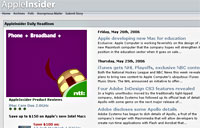 Apple’s attempt to identify the sources of leaked product information that appeared on Mac enthusiast websites has fallen flat on its face after a Californian court ruled that on-line reporters and bloggers are entitled to the same protections as traditional journalists.
Apple’s attempt to identify the sources of leaked product information that appeared on Mac enthusiast websites has fallen flat on its face after a Californian court ruled that on-line reporters and bloggers are entitled to the same protections as traditional journalists. The court was having none of it, with a unanimous ruling giving the three online publications protection under the shield law, as well as the constitutional privilege against disclosure of confidential sources.
The court was having none of it, with a unanimous ruling giving the three online publications protection under the shield law, as well as the constitutional privilege against disclosure of confidential sources.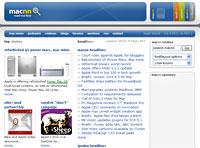 “The shield law is intended to protect the gathering and dissemination of news, and that is what petitioners did here,” added Justice Rushing.
“The shield law is intended to protect the gathering and dissemination of news, and that is what petitioners did here,” added Justice Rushing. In the normal world, if you’d just discovered that your business had lost £14.9bn ($27.9bn) in a single year, you’d be blubbering into your laptop or heading to the pub to down a vat of Old Scrote’s Badger ale.
In the normal world, if you’d just discovered that your business had lost £14.9bn ($27.9bn) in a single year, you’d be blubbering into your laptop or heading to the pub to down a vat of Old Scrote’s Badger ale.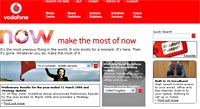 In the white-hot mobile phone segment, Vodafone continues to create growth in key markets such as Germany, Spain and the United States, despite being forced to scuttle out of Japan – selling the business for £8.9bn – after failing to make much of a mark in the country.
In the white-hot mobile phone segment, Vodafone continues to create growth in key markets such as Germany, Spain and the United States, despite being forced to scuttle out of Japan – selling the business for £8.9bn – after failing to make much of a mark in the country.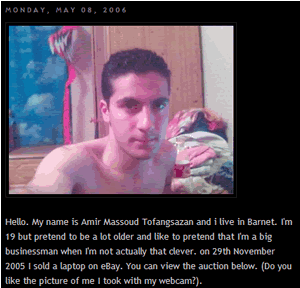 A number of people that we know who have at one time or another had very serious eBay habits have, at one time or another have been ripped off on eBay. Some see it as a right of passage, one that makes you pay that little bit more attention the next time.
A number of people that we know who have at one time or another had very serious eBay habits have, at one time or another have been ripped off on eBay. Some see it as a right of passage, one that makes you pay that little bit more attention the next time.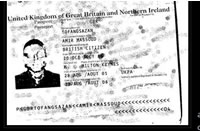 When you realise this is the case you then get angry; contact eBay; they tell you about the scheme they have in place to provide financial recompense; you find out it’s actually not worth doing because the difference between what you paid and the admin charge makes it not worthwhile. You put it down to experience.
When you realise this is the case you then get angry; contact eBay; they tell you about the scheme they have in place to provide financial recompense; you find out it’s actually not worth doing because the difference between what you paid and the admin charge makes it not worthwhile. You put it down to experience. This just in, Steven Carter, Chief Executive Officer of UK communication uber-regulator Ofcom will be standing down with effect from 15 October 2006.
This just in, Steven Carter, Chief Executive Officer of UK communication uber-regulator Ofcom will be standing down with effect from 15 October 2006. The next role for Carter has been the matter of some conjecture, nay gossip. Given Ofcom is seen by a lot of the world as a leader in communications regulation, there are many possible roles. Amoung those mentioned so far have been BSkyB, and with James Murdoch rumoured to be shifting upstairs the position may be open. Hey … how about the FCC?
The next role for Carter has been the matter of some conjecture, nay gossip. Given Ofcom is seen by a lot of the world as a leader in communications regulation, there are many possible roles. Amoung those mentioned so far have been BSkyB, and with James Murdoch rumoured to be shifting upstairs the position may be open. Hey … how about the FCC? PayPal is to be the exclusive online wallet across Yahoo’s product and services. In a wide-ranging, four component, business arrangement announced today, eBay and Yahoo will be stroking each other commercial departments.
PayPal is to be the exclusive online wallet across Yahoo’s product and services. In a wide-ranging, four component, business arrangement announced today, eBay and Yahoo will be stroking each other commercial departments. Interestingly Yahoo will also be offering sponsored search for complementary products on some eBay.com search results pages in the U.S.
Interestingly Yahoo will also be offering sponsored search for complementary products on some eBay.com search results pages in the U.S. For us, this part of the announcement is a bit of a strange one. Yahoo has Yahoo Messenger with Voice and eBay has Skype, so who would provide the voice services in which circumstances is pretty unclear, and we would have though, an area for friction.
For us, this part of the announcement is a bit of a strange one. Yahoo has Yahoo Messenger with Voice and eBay has Skype, so who would provide the voice services in which circumstances is pretty unclear, and we would have though, an area for friction. Over a third of all packaged software installed on PCs worldwide in 2005 was pirated, according to a study released by the Business Software Alliance (BSA), a trade group charged with fighting the use of unauthorised software.
Over a third of all packaged software installed on PCs worldwide in 2005 was pirated, according to a study released by the Business Software Alliance (BSA), a trade group charged with fighting the use of unauthorised software. In fact, some have claimed that BSA’s accounting methods are so inaccurate that it amounts to scaremongering, especially when extrapolating figures from third world countries where just a few programs at full price would cost more than a citizen’s average annual income.
In fact, some have claimed that BSA’s accounting methods are so inaccurate that it amounts to scaremongering, especially when extrapolating figures from third world countries where just a few programs at full price would cost more than a citizen’s average annual income. In third place was France which notched up losses of $3.2 billion, accompanied by a piracy rate of 47 percent, while in Brit-land, 27 per cent of PC software used in the UK was claimed to be illegal.
In third place was France which notched up losses of $3.2 billion, accompanied by a piracy rate of 47 percent, while in Brit-land, 27 per cent of PC software used in the UK was claimed to be illegal. IT workers who spend all day battling with clueless idiots who have just deleted critical OS files because they looked ‘messy’ already know it, but now it’s official: people who work in IT are the most stressed folks on the planet.
IT workers who spend all day battling with clueless idiots who have just deleted critical OS files because they looked ‘messy’ already know it, but now it’s official: people who work in IT are the most stressed folks on the planet. IT
IT A promising anti-spam service by Israeli company Blue Security has been brought to its knees by a renegade spammer hell-bent on protecting his spamming industry
A promising anti-spam service by Israeli company Blue Security has been brought to its knees by a renegade spammer hell-bent on protecting his spamming industry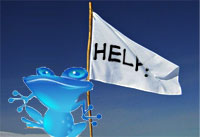 Spammers fight back
Spammers fight back With Blue Security reduced to communicating through their secondary TypePad-hosted Weblog at bluesecurity.blogs.com, the spammer moved in for the kill, launching a ferocious denial of service attack that closed down the TypePad and Live Journal servers owned by Six Apart.
With Blue Security reduced to communicating through their secondary TypePad-hosted Weblog at bluesecurity.blogs.com, the spammer moved in for the kill, launching a ferocious denial of service attack that closed down the TypePad and Live Journal servers owned by Six Apart. UK shoppers are set to spend an average £1,000 each online in 2006, according to the yearly report by the Interactive Media in Retail Group (IMRG).
UK shoppers are set to spend an average £1,000 each online in 2006, according to the yearly report by the Interactive Media in Retail Group (IMRG). According to IMRG’s own research, usability, customer retention, and interactive marketing were cited as the biggest concerns by over half of their members, with e-crime and delivery fulfilment seen as high-priority issues by around a third.
According to IMRG’s own research, usability, customer retention, and interactive marketing were cited as the biggest concerns by over half of their members, with e-crime and delivery fulfilment seen as high-priority issues by around a third. Compare that to stingy shoppers in the south who said that they’d spend no more than £50 per month online, and wouldn’t dream of shelling out sums as high as £5,000.
Compare that to stingy shoppers in the south who said that they’d spend no more than £50 per month online, and wouldn’t dream of shelling out sums as high as £5,000. The frequencies 1781.7-1785MHz paired with 1876.7-1880MHz known as the GSM Guard bands have been made available to 12 licensees under the Wireless Telegraphy Act. They are national UK licenses, though the operators of the licenses will have to cooperate amongst themselves so that interference between themselves doesn’t occur. Ofcom expect the licensees to form an industry body that will self-regulate. Operators will also be required to register all radio equipment in the “Sitefinder” database (currently populated by the GSM and 3G operators).
The frequencies 1781.7-1785MHz paired with 1876.7-1880MHz known as the GSM Guard bands have been made available to 12 licensees under the Wireless Telegraphy Act. They are national UK licenses, though the operators of the licenses will have to cooperate amongst themselves so that interference between themselves doesn’t occur. Ofcom expect the licensees to form an industry body that will self-regulate. Operators will also be required to register all radio equipment in the “Sitefinder” database (currently populated by the GSM and 3G operators). Winning Licensees
Winning Licensees New entrants could enter into roaming agreements with the current operators, but unless Ofcom mandates this (which is unlikely) there’s likely to be strong opposition. Since some of the license winners already have GSM networks, they can offer localised services knowing there’s no interference problems with existing infrastructure.
New entrants could enter into roaming agreements with the current operators, but unless Ofcom mandates this (which is unlikely) there’s likely to be strong opposition. Since some of the license winners already have GSM networks, they can offer localised services knowing there’s no interference problems with existing infrastructure.